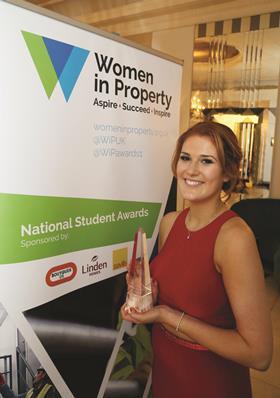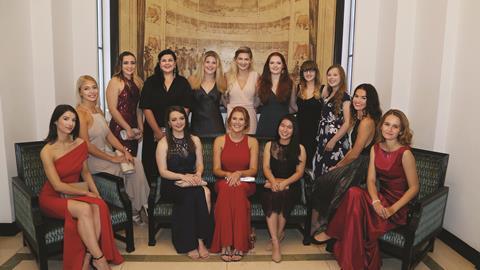“Never underestimate what you know.” That was the message from Sandi Rhys Jones, businesswoman and entrepreneur, as she addressed a roomful of some of the brightest and best young women in the industry at Women in Property’s 11th annual National Student Awards.
Women in Property, which is dedicated to the advancement of women in the property industry, gave its highest student accolade to Katie McManus from Sheffield Hallam University at the Best of Best Awards Dinner at Claridges.

Property Week attended the evening and spoke to three of the student participants to find out what the future of the industry holds and what the experiences of women in property can teach us all.
Alice Fox is studying architectural engineering and design management at Loughborough University and is six weeks into a year-long placement at luxury residential construction firm Walter Lilly. Her interest in architectural engineering began at school, where she had a desire to combine her love of art, maths and physics, the subjects she chose for her A-Levels.
“I loved the mix of creativity and science,” she says. “One of my teachers mentioned property as a career opportunity,” she adds. “Based on what I enjoyed, she saw that it could be something for me.”
The 14 nominees are studying at universities across the country, on a variety of property-related courses and are all different ages, with varying experiences of the industry so far.
The idea of encouraging diversity beyond gender was a theme of Rhys Jones’ speech. She told the story of a Women in Property outreach programme at one of London’s most economically deprived and ethnically diverse schools that involved taking school children to Waterloo Bridge, also known as ‘Ladies’ Bridge’, because it was rebuilt during the Second World War by an all-female team of engineers. After this visit, the children returned to their classrooms to talk to a panel of prominent women in the industry.
Rhys Jones argued that the value of this exercise was to show schoolchildren that property was not just populated by hard-hatted stereotypes but was an industry for anyone, regardless of their background or gender.
Improving awareness
Olivia Ashby is studying real estate management at Oxford Brookes University. She has always had an interest in property, but did not originally know that the degree she is currently studying was an option.
As a result, her first foray into the property industry was a degree in architecture. Discovering that this was not really what she wanted from a career in property, she eventually found her current course in real estate management.
According to Ashby, the idea that property is an industry limited to a handful of career choices is a common misconception. It is one she has fallen victim to and still comes across with many other people.“Most people think I’m studying to become an estate agent. But that’s not what it is.”
McManus, the winner on the night, is studying chartered surveying at Sheffield Hallam University. Her experience has been similar to Ashby’s.
She says that she had never heard of her course until her grandad mentioned it. She believes people do not always wind up working in property because they have a skill for it.

“It’s more through people you know,” she says. To improve awareness of the courses available and make them accessible to a wider range of people, both Ashby and McManus believe more needs to be done to engage with people from a young age through programmes such as those mentioned in Rhys Jones’ speech.
“It would be great to go into my own old school to talk about the industry,” McManus says.
Fox believes this lack of engagement with young people could also explain property’s chronic gender imbalance. On the issue of the percentage of women in the property industry, the nominees quote different surveys with varying results, but the figure is consistently low. This is something all three nominees have experienced first-hand.
“It’s not an easy issue to solve,” says Fox. “There’s a lot of stigma. I’m one of three girls in a site office of 25.” Ashby adds: “As a female, I feel somewhat underrepresented. I guess I want to prove that it doesn’t matter that you’re a woman.”
McManus says she has been shocked by some of the statistics and studies she has read on women in property and some of the stories she has heard about sexism in the industry. “It is just not OK,” she asserts.
McManus is not sure what the solution is. She says she does not completely agree with boardroom quotas and argues that those working in property should focus instead on making the industry as a whole more accessible to women.
Rhys Jones echoed this sentiment in her speech, imploring the managing directors and chief executives present to “spot talent early and keep it”. She was also keen to move away from focusing purely on percentages and instead spend some time considering the progress that has been made. “There are more than 200,000 women in the industry,” she pointed out.
Changing attitudes
Rhys Jones said that a change in attitude was helping to improve the outlook for women in the industry. She claimed that “there are more men in the industry with daughters who are asking them: ‘You weren’t at the President’s Club, were you daddy?’”
While all three women say that they would have loved to win, the award could only go to one person. Reflecting on her victory, McManus says: “The evening at Claridges was great, particularly to network with other students and professionals, which is essential to further my career.”
McManus wants to thank Women in Property; Sheffield Hallam University; the North East and Yorkshire sponsor, Christopher Smith Associates; and Lambert Smith Hampton, where she is on placement, for their support.
“I’ve learned so much about myself and the issues surrounding gender. Change needs to happen and I hope to play a part in that,” she stresses. “I’m proud to be an ambassador for Women in Property.”
Despite their concerns over the sector’s lack of women, all three nominees are optimistic about the future of the industry based on their experiences so far.

As young people just entering the industry, they also bring a fresh perspective – and identify several trends that stand out.
Ashby believes that as the industry does more to reach out to younger people from a more diverse background, technology will become a bigger part of the industry. She sees this as a virtuous cycle: young people are early adopters of tech, and more tech in the industry inspires more young people to join the industry.
The technology that she foresees having the biggest impact is smart buildings, structures which can respond via sensors to their users’ behaviour and modulate their energy and lighting use accordingly.
She also believes co-living could change the market dramatically. While this idea is not a technological one, it is one being spurred on by apps such as WeLive and Colive.
Tech revolution
For Fox, the tech that has the most potential to revolutionise the industry is building information modelling (BIM). Describing the technology as a kind of cloud storage for architects, she has already seen first-hand how useful BIM can be.
Taking a global political view, McManus believes that a lot of the industry’s future will depend on what happens with Brexit.
But she believes that any negative impact on the UK property market will be counteracted by the Trump effect. His negative policies towards East Asia, she argues, are part of the reason there is an increase in East Asian investment in the UK.

“In terms of women, I’d like to think change will happen,” she says. “With the press surrounding the President’s Club along with various other things, change needs to happen,” she adds.
As for how to make that change happen, McManus believes that events such as those organised by Women in Property will help. The industry will have to keep an eye on people like McManus: she and her fellow participants are a sign of things to come.





























No comments yet